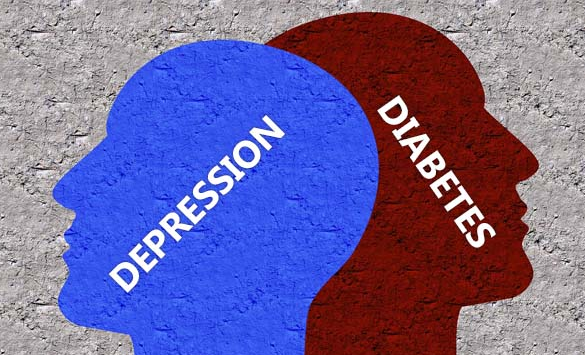A common metaphor used to understand diabetes is that the “diabetic patient lacks sweetness in life”. While this is by no means meant to represent any individual patient’s experience with diabetes, some people do find an element of truth to this statement. And when you consider that depression often coexists with diabetes, this statement gets even closer to home. The medical community recognizes the relationship between elevated blood sugar levels and conditions such as heart and kidney disease; we now also recognize that elevated blood sugar and depression are also closely linked. Depressed patients are less likely to engage in effective self-care practices such as exercise and cooking nutritious meals from whole foods (foods that have one ingredient on their list/foods that come directly from planet earth: think fruits, vegetables, nuts, seeds, beans, fish, meat), which only exacerbates their increasing blood sugar levels. Our bodies do not like our blood sugar levels to be too high (or too low, for that matter).
As blood sugar levels rise, the pancreas pumps out more insulin to siphon the sugar out of our bloodstream and into the cells of our bodies for use as energy, or to be stored for later as triglycerides, or fat-storage molecules. The problem is that if we constantly have high levels of insulin in our bloodstream, the cells in our body become “resistant” to insulin. Think of insulin as a stereo, playing a message to the cells that glucose is outside, can they please open their doors and let in glucose in? The cells get that message and open up their doors. If, however, there is lots of glucose and therefore lots of insulin, the message played by insulin gets louder and louder. In an effort to “plug their ears” from insulin’s now-very loud message, the cells open fewer doors, so less glucose can get into the cells, and more insulin must then be produced. This is a state of insulin resistance, which is a precursor to diabetes, and occurs in the early stages of type II diabetes.
Among several other effects, insulin resistance and blood sugar dysregulation have marked disruptive effects on sleep, and can contribute to the development of sleep apnea. Sleep is one of the most fundamental activities required for optimum mental health, so sleep disturbance feeds the negative spiral into worsening health for patients suffering from depression and diabetes. By addressing lifestyle factors including diet (primarily, removing refined carbohydrates from the diet and adding in protective antioxidants and polyphenols from fruits and vegetables, as well as appropriate amounts of protein), exercise levels (implementing realistic movement goals appropriate for each patient), and sleep (making sure you’re getting restful, rejuvenating sleep), help you feel better mentally, emotionally, and physically. We’ve also noticed that weight loss, an alert mind, regular and sustainable energy levels, and clear skin happen to be pleasant side effects. Omega-3 fatty acids from fish oil, may aid healing after heart attack. Giving heart attack patients a high dose of omega-3 fatty acids from fish oil, daily for six months after a heart attack improved the function of the heart and reduced scarring in the undamaged muscle, according to new research in the American Heart Association’s journal Circulation. The heart’s shape and function can be altered after a heart attack, a condition known as post-heart attack remodelling and it is linked with poor patient outcomes and could lead to heart failure. Therapies that can improve healing of the heart or prevent adverse remodelling, remain scarce.
A previous study found that omega-3 fatty acids from fish oil were associated with improved survival for heart attack patients, but the role of omega-3 fatty acids in improving the structure and tissue of the heart in patients receiving current guideline-based therapy after a heart attack was unknown. In the new OMEGA-REMODEL randomized clinical trial, researchers found compared to those taking a placebo, patients taking a dose of 4 grams of omega-3 fatty acids daily for six months: experienced a 5.8 percent reduction in left ventricular end-systolic volume index: a clinical marker that can predict patient outcome after a heart attack; and had a 5.6 percent reduction in a measurement of scarred connective tissue (fibrosis) formation in the nondamaged heart muscle.
“Heart failure is still a major problem after a heart attack despite all the therapy we have and the advances in interventional care,” said Raymond Y. Kwong, M.D., M.P.H., senior author of the study and director of Cardiac Magnetic Resonance Imaging, Brigham and Women’s Hospital and an associate professor of medicine at Harvard Medical School in Boston, Massachusetts. “Our findings show that omega-3 fatty acids are a safe and effective treatment in improving cardiac remodelling, so it may be promising in reducing the incidence of heart failure or death, which are still major healthcare burdens to patients who suffer a heart attack.” Researchers said these results suggests that omega-3 fatty acids allow the heart to contract better, and also reduces the fibrosis in the region that is not damaged.
The researchers also observed a reduction in biomarkers for inflammation, suggesting that omega-3 fatty acids have some anti-inflammatory properties. The study involved 360 heart attack survivors, half were given a high dose omega-3 fatty acids and half placebo, beginning within a month of the heart attack. Because the study participants were given high doses of omega-3s in addition to their other medications, patients were under a physician’s care and observed for any potential adverse outcomes by study authors throughout the study. The treatment was found to be safe and effective. Both groups received treatment based on guidelines issued by the American College of Cardiology Foundation and the American Heart Association. Blood tests were used to confirm that patients in the omega-3 fatty acids group were taking the treatment.
(Author is a Radiodiagnosis student at Government Medical College, Anantnag)








